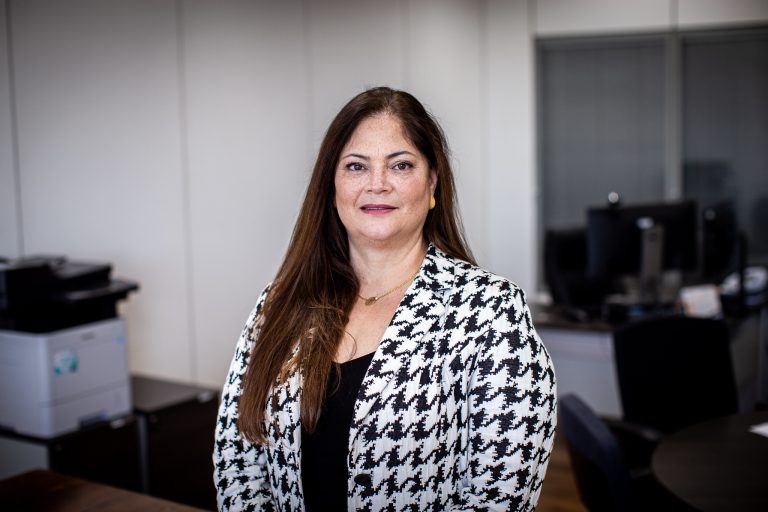São Paulo – Brazil has an open public consultation on a possible trade agreement between Mercosur and the United Arab Emirates. The goal of the Foreign Trade Secretariat of the Ministry of Development, Industry, Commerce, and Services of Brazil with the consultation is to listen to the private sector, scholars, civil society, and other interested parties to map offensive and defensive interests, concerns and opportunities in trade with the UAE.
The public consultation, which will remain open until December 18, covers, in addition to access to markets for goods, non-tariff matters such as regulatory measures, services, digital commerce, investments, and sustainable development.
According to Ana Claudia Takatsu (pictured above), director of the International Negotiations department of the Foreign Trade Secretariat, in a meeting held in August, the Arab country conveyed its interest in a comprehensive trade agreement to Mercosur members. The topic was also presented during a visit by the UAE minister of state for Foreign Trade, Thani Ahmed Al Zeyoudi, to the Brazilian Ministry earlier this year.
Al Zeyoudi reaffirmed his interest in strengthening the partnership with Mercosur both in the meeting with Ministry representatives and with the other Mercosur countries he visited. He presented a term of reference for launching a negotiation.
“In this conversation, the UAE’s Foreign Trade minister proposed to start a dialogue. He showed great interest in making a trade agreement with us and the other Mercosur countries,” Takatsu told ANBA.
The director said the Secretariat chooses priority agreements to focus on and conclude. “If there are too many agreements at the same time, we cannot dedicate ourselves appropriately to any of them,” she said. The same team is responsible for all agreements.
A possible agreement with the UAE was not a priority for this semester, which is filled by negotiations on the Mercosur-European Union free trade agreement. “We could make faster and more significant progress in the next semester,” she said.
“Negotiations with the UAE only began in the second half of this year. As this path is long, the first step in launching negotiations is carrying out a public consultation and an impact assessment study, which are ongoing. The program included the possibility of starting negotiations with the UAE in the first half of next year,” said the director.
Argentina, Uruguay, and Brazil are major agricultural producers, the first two in beef production, and Brazil is also a prominent producer of poultry, all with halal slaughter, recalled Takatsu. “We are the largest in the world with this characteristic. In a preliminary assessment, it seemed to us like an agreement that could bring positive results,” she said.
But first, Brazil needs to carry out internal negotiations. “The public consultation and impact study results will be submitted to the Chamber of Foreign Commerce to authorize the negotiation. Then, a document will be sent to Mercosur, and the terms of reference for the negotiation will be signed,” she said.
Then, the Mercosur proposal will be drafted, with the interests of the four countries [Brazil, Uruguay, Argentina, and Paraguay], and the interests of the UAE will be heard in the negotiation, according to the director.
The UAE is considered a gateway to the Gulf markets. The Brazilian government sees a potential to promote investments and diversify bilateral trade. “We always receive positive and very encouraging proposals. I look at the [Gulf] region as a whole – the market there is up-and-coming, and [an agreement with the UAE would be] also essential to gain access to neighboring countries,” said Takatsu.
In 2022, trade between Brazil and the UAE was USD 5.7 billion, a 75% expansion over the previous year. Brazilian exports to the Gulf country totaled USD 3.26 billion in 2022, a 40% increase from 2021. The best-selling Brazilian goods in the Arab country were poultry, sugar, and beef.
European Union
Ana Takatsu reported work on the agreement with the EU has been intense. “We are working very hard to reach an agreement with the EU. Mercosur has been very flexible, and Brazil is committed to the environmental agenda,” she declared in an interview last week.
“By December, we think there is a great possibility of concluding the negotiations, which does not mean that the agreement will be signed because the text has to be translated into several languages, and then we will need the finished text, which could take a few months. Then, it could be signed by the presidents,” she explained.
“We are seeking to diversify trade partnerships, working on fronts to allow our products access to new and promising markets,” said Tatiana Prazeres, Secretary of Foreign Trade of the Ministry of Development, in a statement.
The Ministry’s general coordinator of extra-regional negotiations, Rafael Lameiro, also participated in the interview.
Translated by Elúsio Brasileiro




